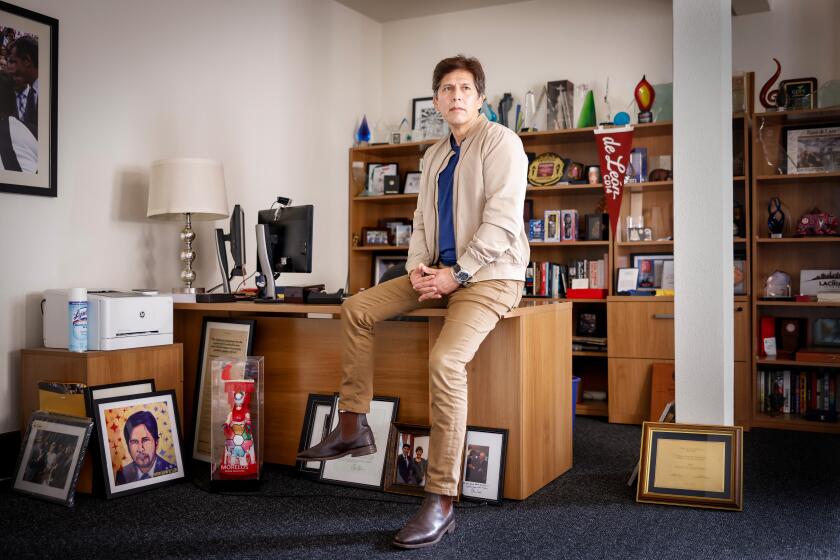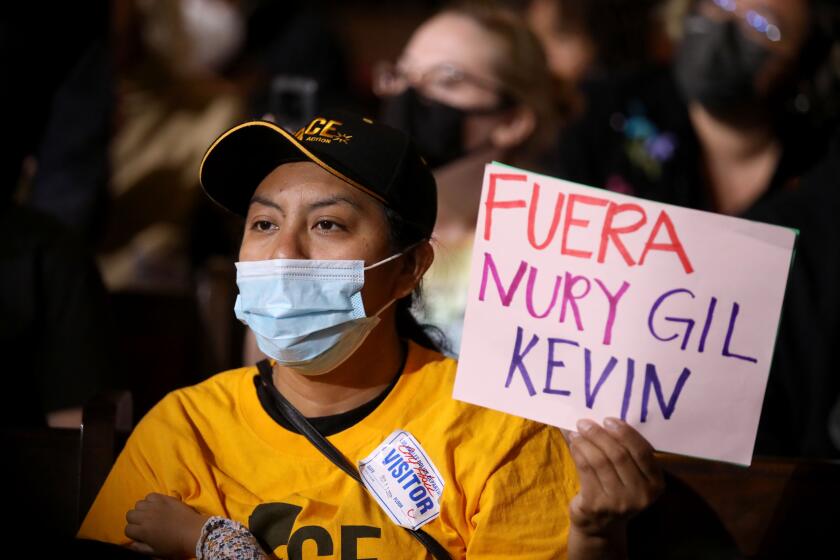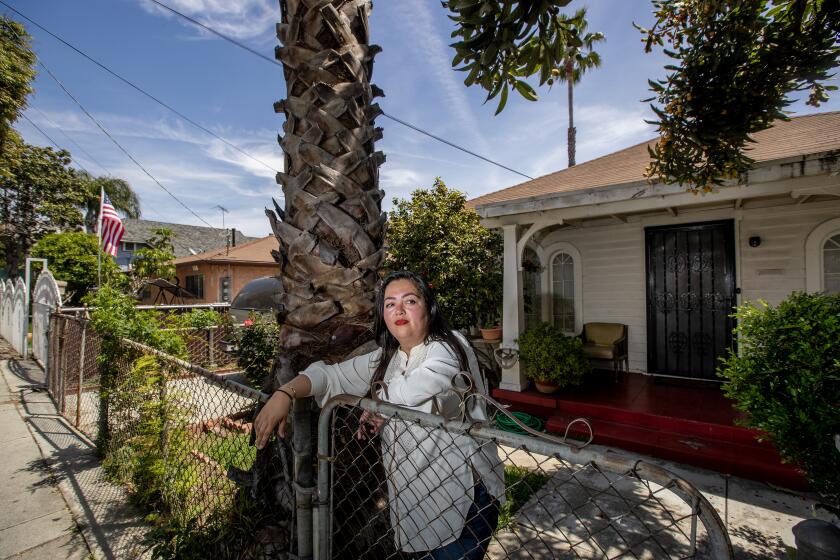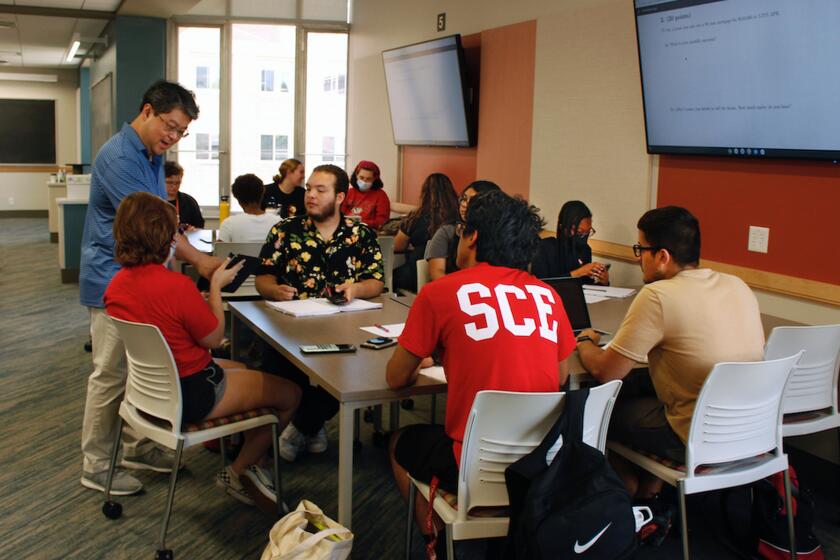Column: What would Kevin de León’s comeback mean for Los Angeles?
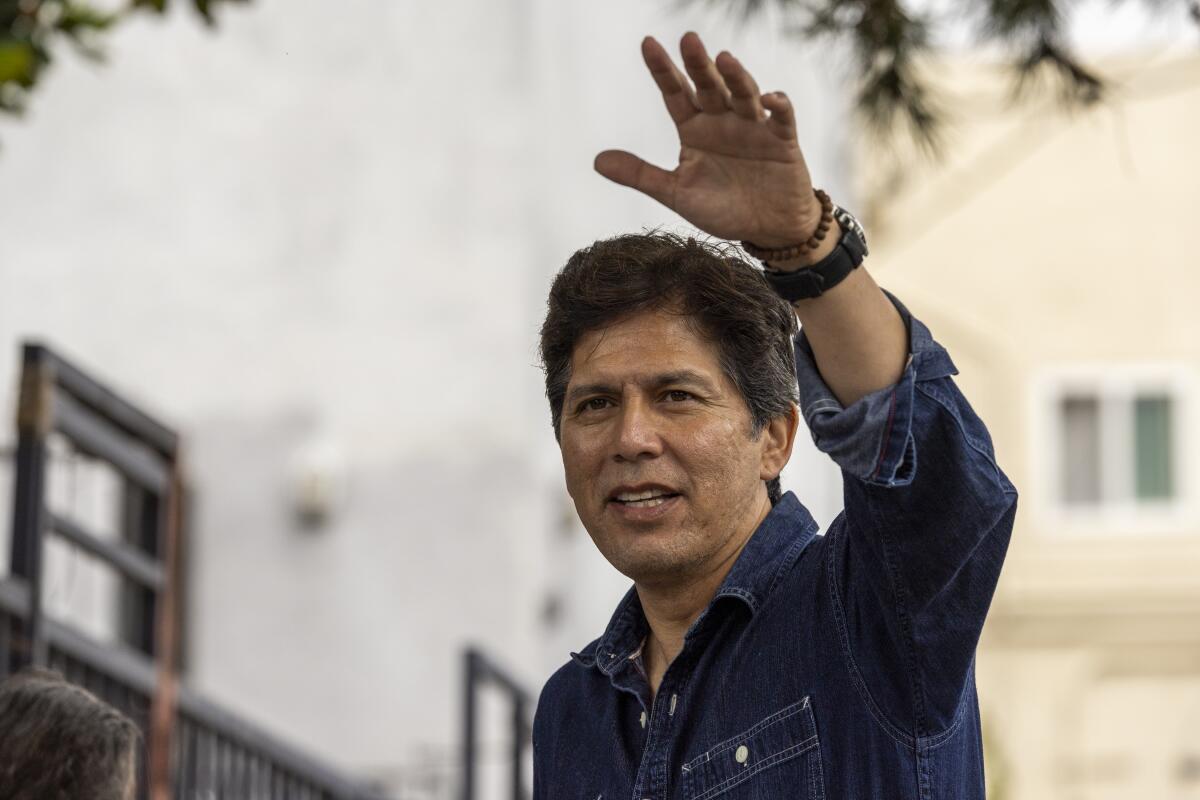
- Share via
Kevin de León has lost the trust of countless Angelenos. But he does have a path to reelection on the City Council, albeit an uphill one.
What will it mean for L.A. politics if his Eastside district gives him another chance?
Opinion Columnist
Jean Guerrero
Jean Guerrero is the author, most recently, of “Hatemonger: Stephen Miller, Donald Trump and the White Nationalist Agenda.”
Some activists are already framing a potential victory as evidence of pervasive anti-Blackness among Latinos. De León, of course, refused to resign after a secretly recorded conversation with then-Councilmembers Nury Martinez and Gil Cedillo filled with divisive and racist comments was made public. The city suffered through weeks of angry public protests over De León’s refusal to leave despite demands for his resignation from just about every political leader in L.A. He survived a failed recall attempt in the spring, and now he’s engaged in a comeback tour.
If De León’s mostly Latino constituents forgive his silences and the ugly racist jokes in that recorded conversation, does it reflect their own racism?
Kevin de León is the last one standing after an audio leak caught him in a conversation that featured racist and derogatory remarks. Now he’s running for reelection.
Anti-Blackness is indeed too common among Latinos and should be challenged. The wounds caused by that taped conversation have not healed. But most of De León’s colleagues on the City Council have continued working with him in spite their dislike of him because they recognize his constituents’ needs — not because they condone anti-Blackness or other racism.
“Democracy dictates who we serve with,” Councilwoman Monica Rodriguez told me. Within the City Council, she led the opposition to a motion that would have limited De León’s power to use discretionary funds for his district. Two new Latinx council members, Eunisses Hernandez and Hugo Soto-Martinez, are mostly steering clear, and remain reluctant even to appear at public events with him.
I immediately recognized how the L.A. politicians were weaponizing Spanglish on the tape. Now, Nury Martinez, Kevin De León and Gil Cedillo are maintaining they were talking as Latinos normally do.
It remains to be seen whether De León’s constituents will give him another chance. Many residents, such as 40-year-old Alessandro Negrete, view him as another corrupt leader in a long line of Eastside politicos who’ve let the community down. “Because of people like Kevin, people have lost faith in our democracy,” he told me, adding that the consequence has been low voter turnout in the district.
De León also has supporters. Not all are racist. Some believe his actions that have helped working-class people of color throughout his nearly 20 years in office speak louder than his words in the leaked recording.
Still, it’s likely that California Assemblywoman Wendy Carrillo, who is running for De León’s District 14 seat, would be a better leader. So would Assemblymember Miguel Santiago, who’s also running, and another challenger, Ysabel Jurado, a Filipino American who is making an appeal to voters who want a trustworthy leader, regardless of race. Jurado, a tenant rights attorney and single mother, grew up in a matriarchal immigrant family that taught her the importance of “reliance on each other,” she told me.
Immigration is a defining issue for both candidates. But Carrillo believes she can stand up to law enforcement while building more bridges.
An understanding of interdependence is crucial in leaders, but it’s also important in those of us striving to hold our leaders accountable. “Movements need to become the practice ground for what we are healing towards,” wrote adrienne maree brown in her book “We Will Not Cancel Us,” in which she argued against a punitive culture that is consuming progressive movements from the inside.
Painting Latinos to be enemies of Black people, despite a history of strong allyship, plays right into the hands of right-wing and white supremacist propagandists, who’ve used the scandal to fuel Black-Latino division.
One popular white nationalist site uses the leaked City Council recording to argue that “Hispanics are no friends of blacks.” The article says: “Granted, whites are the Great Replacement’s main target and will be its first victims. But blacks will be next on the chopping block as more Hispanic immigrants assume political power.” The false and racist “replacement” theory, popularized among conservatives by Fox News, inspired the 2019 anti-Latino El Paso massacre and other terrorism.
An activist surveyed the students and found a mental health crisis fueled by financial fears and loneliness.
More traditional conservative outlets have used the scandal to pathologize racial justice advocacy and cast L.A. as a cesspool of Black-brown infighting.
“The Left’s obsession with racial power politics is a deadly societal pathology,” says an article in the Washington Examiner about the leaked recording, arguing for colorblindness. The impulse to punish De León’s district for his mistakes will certainly be used by propagandists to stoke even greater division.
In the year since the scandal broke, many Angelenos have wondered who leaked the recording and why. The motive remains unclear, even as De León and Cedillo are suing two ex-employees of the L.A. County Federation of Labor (Cedillo is also suing the federation) for invasion of privacy in connection with the leak.
In an interview with La Opinión, Cedillo laid out his conspiracy theory: “We were dragged by a mafia led by the L.A. Times.” In his lawsuit, De León positioned himself as a victim of “legacy media outlets.” Their placing blame on journalists is accepted by some of their supporters, just as many people accept Donald Trump’s attacks on “fake news.” It is always easier to scapegoat the media when the news is ugly and the consequences damaging.
Odilia Romero, co-founder of Comunidades Indígenas en Liderazgo (CIELO), which helps Indigenous people in De León’s and other districts, has complicated feelings about the leak of the conversation, which included racist comments about Indigenous Oaxacans. “I think it did harm,” she told me, adding that it has emboldened people to express anti-Indigenous sentiments, in her experience.
At the same time, Romero said, the scandal strengthened bonds between Black and Indigenous people. It inspired Councilmember Hernandez to push for language access for Indigenous people and Indigenous-led initiatives.
Life is complicated. Events, like people, can be good and bad. If De León makes a comeback, it will be because he convinced a majority of his constituents that at the end of the day, he was more good than bad. His chances are slim, but they exist.
More to Read
A cure for the common opinion
Get thought-provoking perspectives with our weekly newsletter.
You may occasionally receive promotional content from the Los Angeles Times.

